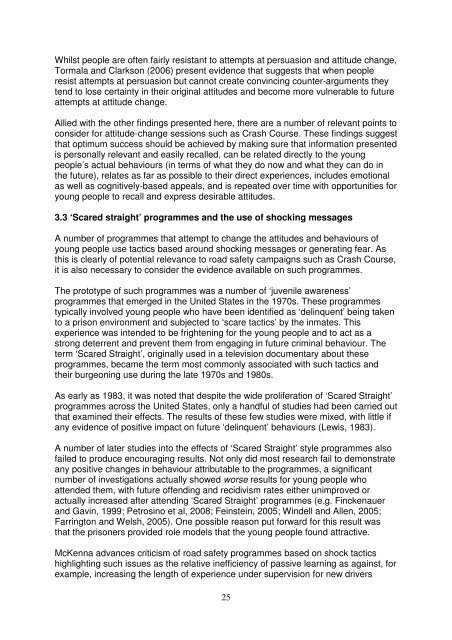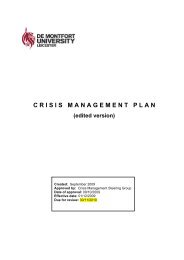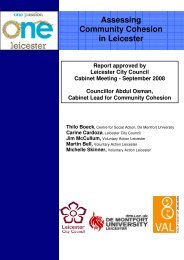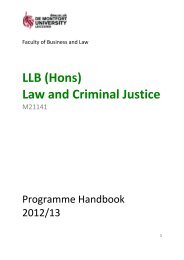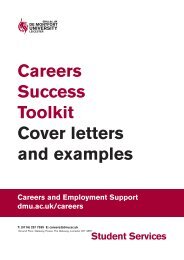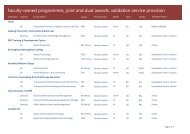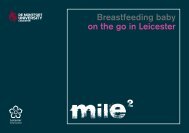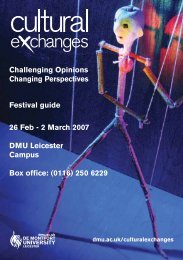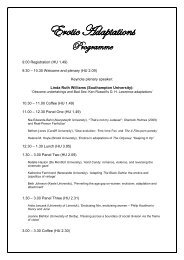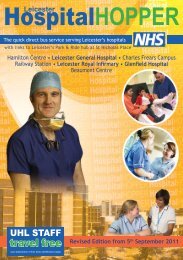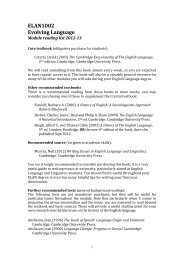Evaluation of the Crash Course March 2009 - De Montfort University
Evaluation of the Crash Course March 2009 - De Montfort University
Evaluation of the Crash Course March 2009 - De Montfort University
Create successful ePaper yourself
Turn your PDF publications into a flip-book with our unique Google optimized e-Paper software.
Whilst people are <strong>of</strong>ten fairly resistant to attempts at persuasion and attitude change,<br />
Tormala and Clarkson (2006) present evidence that suggests that when people<br />
resist attempts at persuasion but cannot create convincing counter-arguments <strong>the</strong>y<br />
tend to lose certainty in <strong>the</strong>ir original attitudes and become more vulnerable to future<br />
attempts at attitude change.<br />
Allied with <strong>the</strong> o<strong>the</strong>r findings presented here, <strong>the</strong>re are a number <strong>of</strong> relevant points to<br />
consider for attitude-change sessions such as <strong>Crash</strong> <strong>Course</strong>. These findings suggest<br />
that optimum success should be achieved by making sure that information presented<br />
is personally relevant and easily recalled, can be related directly to <strong>the</strong> young<br />
people’s actual behaviours (in terms <strong>of</strong> what <strong>the</strong>y do now and what <strong>the</strong>y can do in<br />
<strong>the</strong> future), relates as far as possible to <strong>the</strong>ir direct experiences, includes emotional<br />
as well as cognitively-based appeals, and is repeated over time with opportunities for<br />
young people to recall and express desirable attitudes.<br />
3.3 ‘Scared straight’ programmes and <strong>the</strong> use <strong>of</strong> shocking messages<br />
A number <strong>of</strong> programmes that attempt to change <strong>the</strong> attitudes and behaviours <strong>of</strong><br />
young people use tactics based around shocking messages or generating fear. As<br />
this is clearly <strong>of</strong> potential relevance to road safety campaigns such as <strong>Crash</strong> <strong>Course</strong>,<br />
it is also necessary to consider <strong>the</strong> evidence available on such programmes.<br />
The prototype <strong>of</strong> such programmes was a number <strong>of</strong> ‘juvenile awareness’<br />
programmes that emerged in <strong>the</strong> United States in <strong>the</strong> 1970s. These programmes<br />
typically involved young people who have been identified as ‘delinquent’ being taken<br />
to a prison environment and subjected to ‘scare tactics’ by <strong>the</strong> inmates. This<br />
experience was intended to be frightening for <strong>the</strong> young people and to act as a<br />
strong deterrent and prevent <strong>the</strong>m from engaging in future criminal behaviour. The<br />
term ‘Scared Straight’, originally used in a television documentary about <strong>the</strong>se<br />
programmes, became <strong>the</strong> term most commonly associated with such tactics and<br />
<strong>the</strong>ir burgeoning use during <strong>the</strong> late 1970s and 1980s.<br />
As early as 1983, it was noted that despite <strong>the</strong> wide proliferation <strong>of</strong> ‘Scared Straight’<br />
programmes across <strong>the</strong> United States, only a handful <strong>of</strong> studies had been carried out<br />
that examined <strong>the</strong>ir effects. The results <strong>of</strong> <strong>the</strong>se few studies were mixed, with little if<br />
any evidence <strong>of</strong> positive impact on future ‘delinquent’ behaviours (Lewis, 1983).<br />
A number <strong>of</strong> later studies into <strong>the</strong> effects <strong>of</strong> ‘Scared Straight’ style programmes also<br />
failed to produce encouraging results. Not only did most research fail to demonstrate<br />
any positive changes in behaviour attributable to <strong>the</strong> programmes, a significant<br />
number <strong>of</strong> investigations actually showed worse results for young people who<br />
attended <strong>the</strong>m, with future <strong>of</strong>fending and recidivism rates ei<strong>the</strong>r unimproved or<br />
actually increased after attending ‘Scared Straight’ programmes (e.g. Finckenauer<br />
and Gavin, 1999; Petrosino et al, 2008; Feinstein, 2005; Windell and Allen, 2005;<br />
Farrington and Welsh, 2005). One possible reason put forward for this result was<br />
that <strong>the</strong> prisoners provided role models that <strong>the</strong> young people found attractive.<br />
McKenna advances criticism <strong>of</strong> road safety programmes based on shock tactics<br />
highlighting such issues as <strong>the</strong> relative inefficiency <strong>of</strong> passive learning as against, for<br />
example, increasing <strong>the</strong> length <strong>of</strong> experience under supervision for new drivers<br />
25


